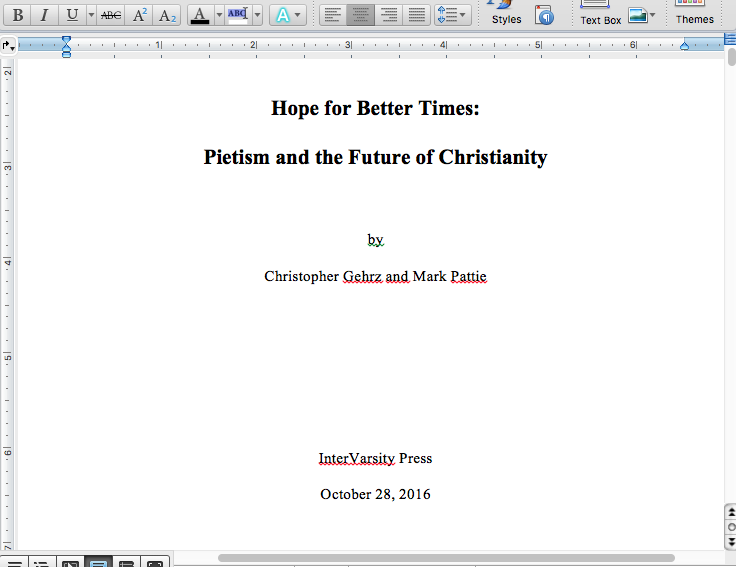A big moment in my career happened last Friday around lunchtime, when I sent this document to our editor at InterVarsity Press:
Yes, this is the manuscript for the book that Mark Pattie and I have been writing all year. There’s still a lot of work left to do before it comes out (maybe next fall?), but getting this draft written is a huge step. Most of all, I’m proud of Mark, for taking on the challenge of writing his first book — on top of all his other duties as a senior pastor of a large church, husband, father, etc. The manuscript is all the better for his having agreed to take part, and I can’t wait for you all to read the finished product.
But in the midst of that excitement, I’m also aware of another, queasier sensation: that of recognizing that I’ve now passed completely into a new stage in my career. As my favorite hip-hop musical about a Founding Father asks near the end of Act One, what comes next?

This is my third book on Pietism, the one most likely to reach a wide audience, and the last I plan to write. I’m sure I’ll keep blogging and speaking about the historical and contemporary significance of Pietism, but at least for now, I feel like I have nothing left to say that would require an entire book.
So I’m in the middle of contemplating new directions. I’ve already submitted one book proposal that’s been rattling around my imagination for a year; before the end of 2016, we should know if it will come to fruition. And, perhaps because of Hamilton, I’ve been toying with the idea of writing a biography. I’m not yet wedded to any particular subject (feel free to share suggestions in the comments section or via email), but I’m sufficiently intrigued by the genre that I’ll be posting a two-part reflection on biography at The Anxious Bench in mid-November.
And there are other non-book projects in the offing. (Just file away the name “Ecclesiola” for future reference.) But I’m also trying to use the second half of my time away from Bethel to engage in the “vocational discernment” that I mentioned when announcing my sabbatical:
It’s struck me that this sabbatical comes at a significant milestone in my career: next May will mark the fifteenth anniversary of receiving my doctorate… fully one-third of what’s likely to be a forty-five year career. So it’s an ideal point at which to reflect on what the next third of my career will look like.
I’m afraid that paragraph caused some of my colleagues to wonder if I was on my way out the door. So no, I am not seeking to leave Bethel.
Nor am I currently looking to shift from the faculty to administrative track. I’ve given considerable thought to that possibility, but at this point, it’s hard to imagine giving up the teaching and writing that I enjoy so much. (The phrase “offer he can’t refuse” comes to mind…)
So what I mean by “vocational discernment” has less to do with changing course than with taking a rare opportunity for a kind of contemplation that Gary Burge finds quite unusual in our profession:
…most of us within the academy do not think about our own adult maps. We can analyze any subject and make discerning critiques of writers in our fields (as some may have already critiqued these paragraphs!). And yet the one thing we rarely do is reflect on ourselves, what we are feeling about our age or our accomplishments or our aims. Simply put, we often lack skilled discernment when we think about life.
A New Testament scholar at Wheaton College, Burge’s own experience of seeking such discernment led him to write Mapping Your Academic Career: Charting the Course of a Professor’s Life (IVP Academic, 2015). In it Burge describes three developmental “cohorts,” each of which
can be distinguished by their possibilities and their risks. It is possible to flourish in any cohort. But it is also possible to fail in any cohort. There is a turning point that characterizes each developmental stage.
So as I read Burge’s book, I’d like to share a few thoughts here. Next time, I’ll reflect on my experience of his Stage One and my first impressions of entering Stage Two.

Very interesting ! Thank you for sharing! I am also in contemplation of, “what is next.”